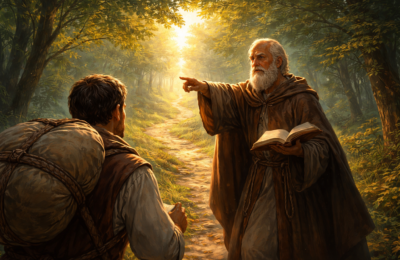Live it out. Share the truth. Walk with courage.
Foundations of a Biblical Worldview – Part 2
Scripture: Genesis 1:27
The Two Roads of Reality
“In the beginning, God created the heavens and the earth” (Genesis 1:1, LSB). That opening line of Scripture confronts us with a fundamental choice: Either God created everything—or He didn’t. And everything hinges on how you answer.
If Genesis is true, then life is full of meaning. Morality is real. Justice matters. You were created on purpose by a personal God.
But if it’s false—if we’re simply the result of time, matter, and chance—then human identity, value, and purpose are just illusions. As Oxford atheist Richard Dawkins famously said, “The universe we observe has precisely the properties we should expect if there is, at bottom, no design, no purpose… nothing but pitiless indifference” (Dawkins, 1995).
It’s one road or the other.
C.S. Lewis captured the force of this choice when he wrote:
“If the whole universe has no meaning, we should never have found out that it has no meaning… If there were no light in the universe… we should never know it was dark. Dark would be without meaning” (Mere Christianity, p. 46).
So let’s take a deeper look: Why does creation matter—today?
Created in His Image
Genesis 1:27 — “God created man in His own image… male and female He created them.”
According to the biblical worldview, your life didn’t begin by accident. It began with design. With intention. With God.
The creation account in Genesis presents humanity as the crown of God’s creative work. Unlike anything else in creation, humans were made in the image of God—bearing unique value, dignity, rationality, and relational capacity. The Hebrew term tselem (image) means we are representatives of God on the earth. Not gods—but image-bearers.
This truth grounds our identity, sexuality, stewardship of creation, and moral obligations. It’s not just the start of the Bible—it’s the start of everything.
Origins Shape Everything
Our world is constantly debating questions of identity, morality, justice, and purpose. But beneath all those debates lies one deeper question: Where did we come from?
Let’s look at how two competing worldviews—Creation and Chance—answer four of life’s most foundational questions.
Question 1: Where did we come from?
- If God created us: You are made in the image of God (Genesis 1:27). You are not an accident. You have purpose, dignity, and worth.
- If everything is chance: You are a highly evolved animal, the result of cosmic luck. There’s no inherent meaning to your existence.
“You have never talked to a mere mortal… it is immortals whom we joke with, work with, marry, snub, and exploit.”
—C.S. Lewis (The Weight of Glory, p. 48)
Question 2: Why are we here?
- If God created us: We were made to glorify God, enjoy Him forever, and steward creation (Genesis 1:28; Isaiah 43:7). Your life matters eternally.
- If everything is chance: There’s no ultimate reason you exist. You can try to create your own meaning—but it’s temporary and subjective.
“If I find in myself a desire which no experience in this world can satisfy, the most probable explanation is that I was made for another world.”
—C.S. Lewis (Mere Christianity, p. 50)
Question 3: How should we live?
- If God created us: Right and wrong flow from the nature of a holy God. Morality is objective and binding (Genesis 9:6).
- If everything is chance: Morality is just a social contract—or an evolutionary survival tool. It changes with the times.
“A man may say he doesn’t believe in Right and Wrong, but try breaking a promise to him and see what he says.”
—C.S. Lewis (Mere Christianity, p. 5)
Question 4: Where are we going?
- If God created us: History is headed toward redemption. Those in Christ have eternal life; those who reject Him face eternal separation (John 3:16; Revelation 21:1–4).
- If everything is chance: Death is the end. There is no judgment, no justice, no eternity. Only silence.
“All the labors of the ages… all the noonday brightness of human genius… are destined to extinction in the vast death of the solar system.”
—Bertrand Russell (A Free Man’s Worship, 1903)
Your View of Genesis Shapes Your View of Everything
Genesis is not optional. It’s foundational.
If you let go of creation, you don’t just lose an origin story—you lose the framework that makes sense of the gospel, the image of God, the Fall, and even the cross. Denying creation leads to confusion in ethics, identity, and purpose.
That’s why R.C. Sproul warned:
“If God is not Creator, then He is not sovereign. If He is not sovereign, then He is not God.”
—R.C. Sproul (Everyone’s a Theologian, p. 52)
A biblical worldview begins with Genesis 1:1 and stands firm on Genesis 1:27. Creation shapes how you live, how you love, how you lead—and what you long for.
Choose Your Road
Here’s the hard truth: Either God created the heavens and the earth—or He didn’t. There’s no neutral ground.
If Genesis is true, then your life has eternal value. But if it’s false, then morality, justice, and meaning are just words we made up to survive a little longer on a dying rock.
“Christianity, if false, is of no importance; and if true, of infinite importance. The only thing it cannot be is moderately important.”
—C.S. Lewis (Mere Christianity, p. 36)
So which road will you walk?
← Previous: What Is a Biblical Worldview?
Next → The Tragedy of the Fall: Understanding Our Broken World
View All: Foundations of a Biblical Worldview
Key Takeaways
- Genesis 1:27 teaches that we are created in God’s image—this truth grounds our identity, value, and purpose.
- The debate over origins is not just scientific—it’s spiritual, moral, and eternal.
- A biblical worldview begins with Creation and shapes how we understand morality, justice, and destiny.








